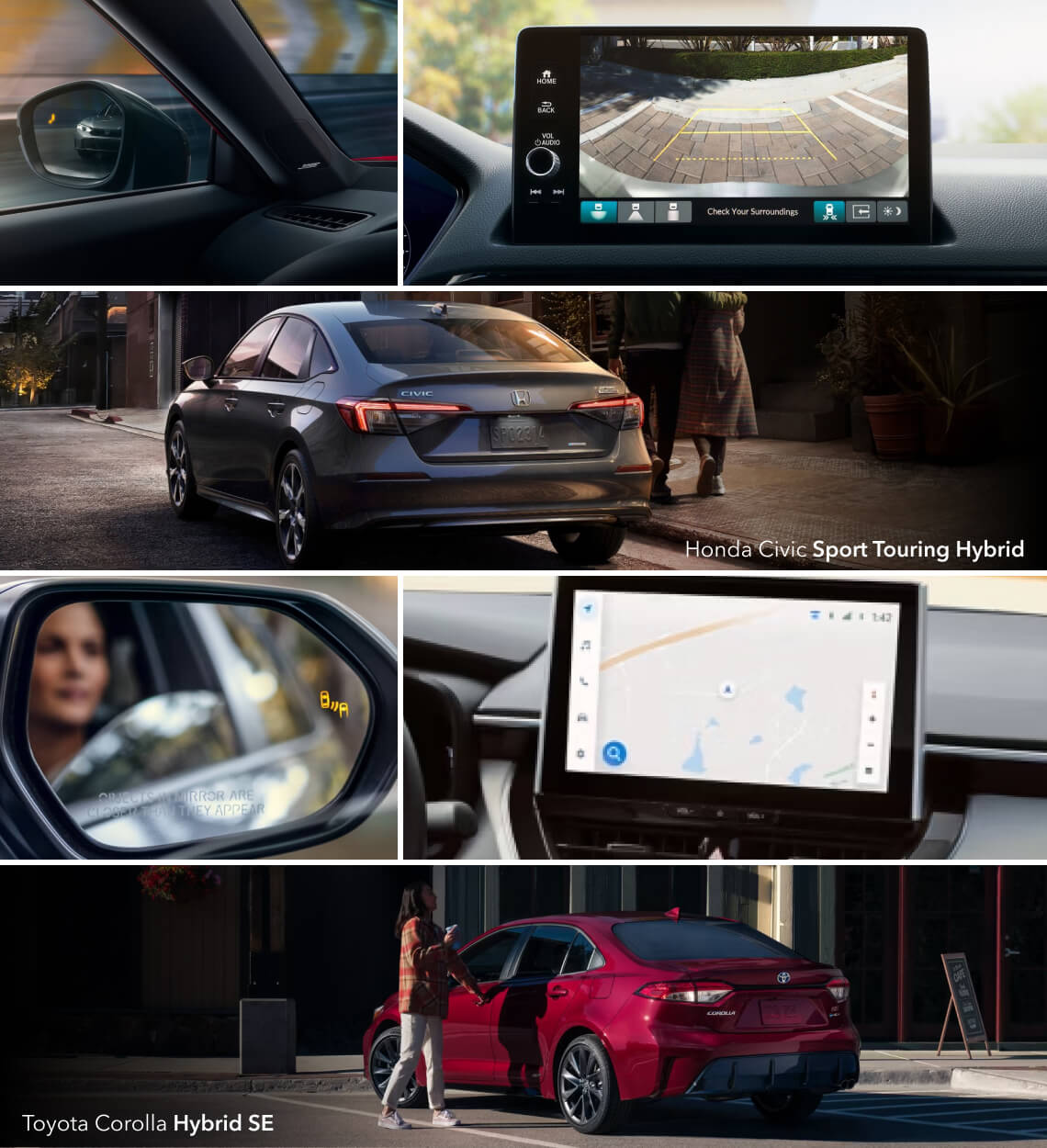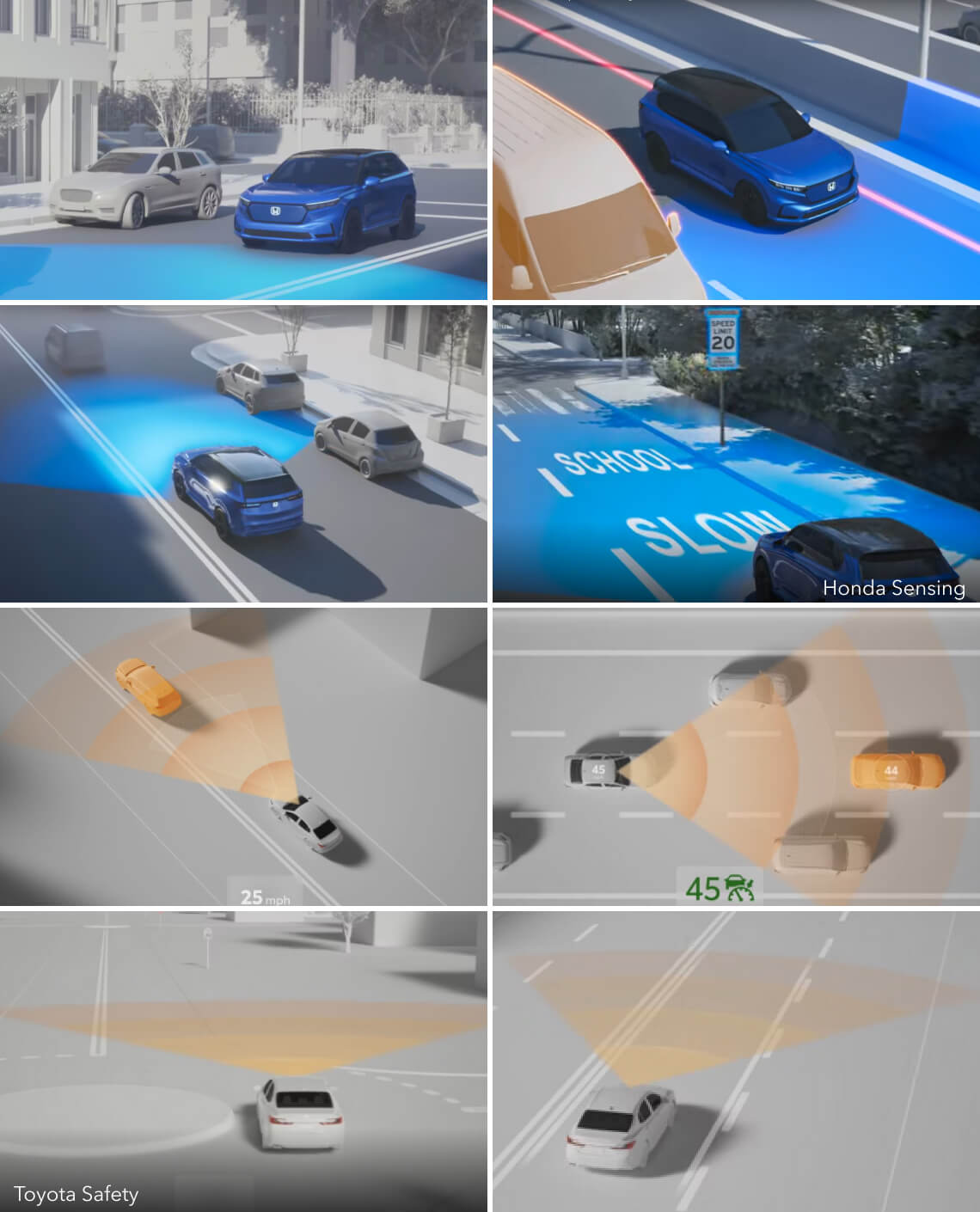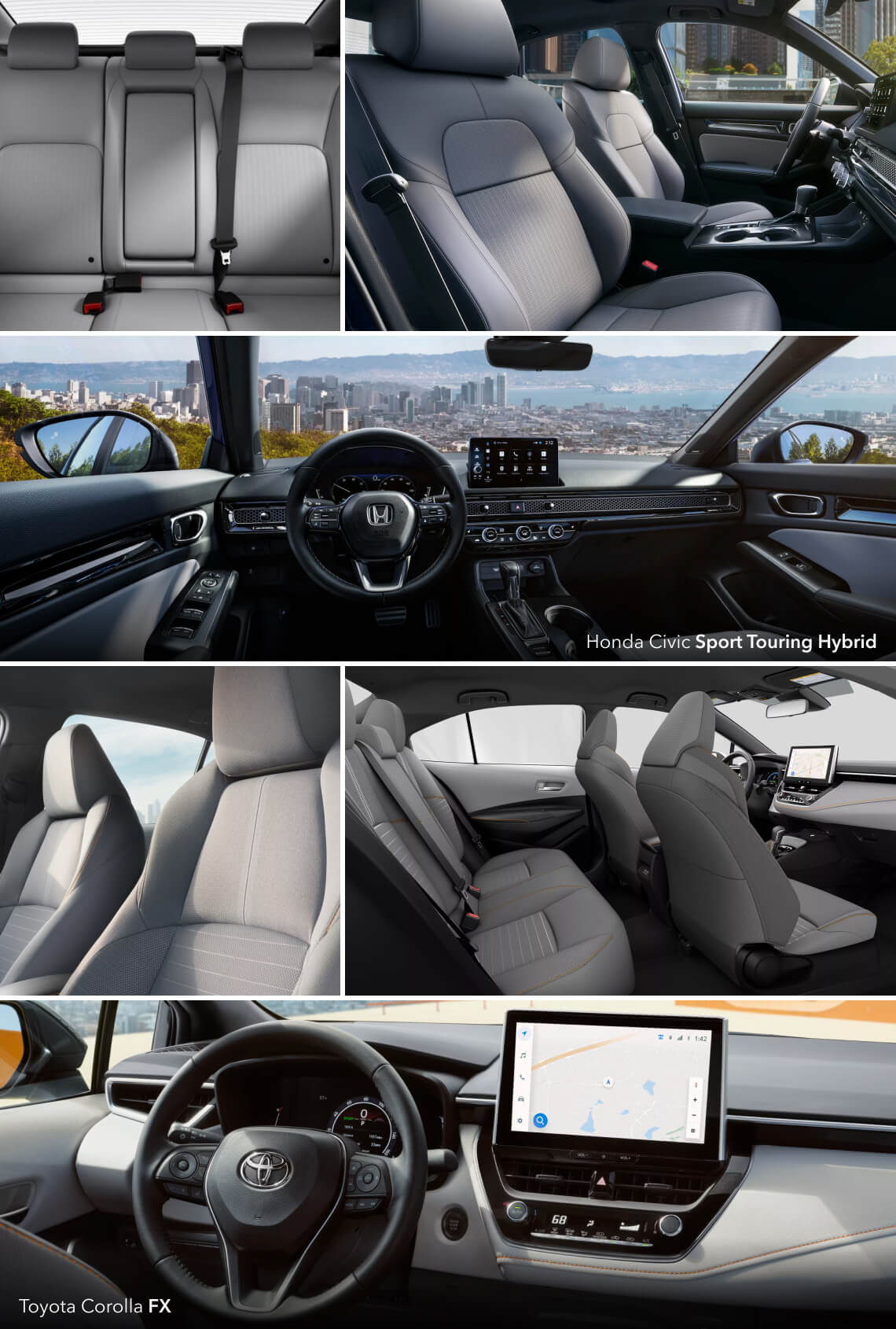Compare The Honda Civic Vs. Toyota Corolla

Are you stuck deciding between the 2025 Honda Civic vs. 2025 Toyota Corolla sedans? If so, you're not alone. Many drivers consider these two remarkable vehicles when looking for a new car. While both offer plenty of enticing perks, when you compare Honda Civic and Toyota Corolla features, the Honda edges out the Toyota model across a few key categories, including safety, comfort, and maximum fuel efficiency.
We've crowned our winner – we'll let you review facts and decide which model takes the cake based on your unique needs. Read on to learn more about both models in our comprehensive Honda Civic vs. Toyota Corolla battle. Then visit us at DARCARS Honda to experience the exceptional Civic for yourself.
Honda Civic vs. Toyota Corolla Specs Overview
- Both the 2025 Honda Civic sedan and 2025 Toyota Corolla sedan are reliable, stylish, and spirited options, but the Civic offers a more thoughtful distribution of features across the trim lineup.
- The 2025 Honda Civic gets a solid refresh for the new model year, including new wheel designs, exterior styling, and upgraded technology.
- The maximum 2025 Honda Civic fuel efficiency rating for gas-powered models is 32/41/36 MPG (City/Highway/Combined),1 which is slightly superior to the Corolla performance.
- The 2025 Honda Civic has available leather seating surfaces, while the Toyota Corolla only offers available synthetic leather upholstery.
A Honda Civic vs. Toyota Corolla Side-by-Side Comparison
| 2025 Honda Civic Sport | 2024 Toyota Corolla SE | |
| Engine | 2.0L 4-cyl | 2.0L 4-cyl |
| Maximum Horsepower | 150 | 169 |
| Transmission | CVT | CVT |
| 0-60 mph Acceleration | 8.9 s3 | TBD |
| EPA-Est. MPG (Cty / Hwy / Comb) | 31 / 39 / 341 | 31 / 40 / 342 |
| Seating Capacity | 5 | 5 |
| Maximum Headroom (Front / Rear) | 39.3 / 37.1 in | 38.3 / 37.1 in |
| Legroom (Front / Rear) | 42.3 / 37.4 in | 42 / 34.8 in |
| Shoulder Room (Front / Rear) | 57 / 56 in | 54 / 51.7 in |
| Hip Room (Front / Rear) | 54.3 / 48.9 in | 53.9 / 51.3 in |
| Maximum Cargo Volume | 14.8 cu ft | 13.1 cu ft |
| Length | 184 in | 182.5 in |
| Width | 70.9 in | 70.1 in |
| Height | 55.7 in | 56.5 in |

Honda Civic vs. Toyota Corolla Reliability & Performance
When it comes to Civic vs. Corolla performance, both sedans offer a smooth and powerful ride. However, the Civic Hybrid models have a maximum horsepower of 200, which exceeds the top 169 horsepower you can get with the hybrid Corolla lineup.
If fuel efficiency is important to you down to the very last mile per gallon, the Honda Civic pulls just ahead of the competition in terms of gas-powered models with an EPA-estimated 32/41/36 MPG (City/Highway/Combined)1 on the LX trim. Meanwhile, the highest gas-only Corolla rating is an EPA-estimated 32/41/35 MPG (City/Highway/Combined).2 The difference may appear small, but it still impacts what you'll pay at the pump.
Fair is fair – we must admit that the Corolla does get the ever-so-slight advantage when we turn our attention to these models' hybrid variants – it's about as close as the gas-only values above. Whether you're in the market for a gas or hybrid sedan, the Civic vs. Corolla matchup is highly competitive, so we have to give the MPG category a tie.
According to RepairPal, the cumulative reliability ratings for both models are outstanding. While the information for 2025 models isn't out yet, both sedans received an "Excellent" score of 4.5 out of 5.0 in 2024.4,5 The average annual repairs and maintenance costs are virtually identical, with the Corolla at $362 and the Honda at $368.4,5 However, the Civic requires an estimated 0.22 visits to the shop per year, while the Corolla requires 0.35 visits.4,5
As you can see, the Corolla and Civic are more similar than different when it comes to performance and reliability – we can't, in good conscience, give the win to either model in this category. However, as you'll see below, the Honda model brings its A game in a couple of critical areas where the Toyota sedan falls short.

Toyota Corolla vs. Honda Civic Trims
When you include its hybrid configurations, the Honda Civic offers a streamlined selection of four trims, all of which are worthy choices for a sedan. Although the Corolla loads you up with four pure gasoline and three hybrid trim options, the Civic's configurations are more elegantly and thoughtfully curated to offer everyone a better driving experience – without the hassle of too many choices.
For example, you get standard heated front seats on the upper two trims of both models. However, that means trim three and four for the Civic – you have to leap up to trims six and seven on the Corolla ladder.
2025 Honda Civic Trims
- 2025 Honda Civic LX
- 2025 Honda Civic Sport
- 2025 Honda Civic Sport Hybrid
- 2025 Honda Civic Sport Touring Hybrid
2025 Toyota Corolla Trims
- 2025 Toyota Corolla LE
- 2025 Toyota Corolla Hybrid LE
- 2025 Toyota Corolla SE
- 2025 Toyota Corolla Hybrid SE
- 2025 Toyota Corolla FX
- 2025 Toyota Corolla XSE
- 2025 Toyota Corolla Hybrid XLE
For the sporty Honda Civic vs. Toyota Corolla variants, the Honda Civic SI is an exciting opportunity to get elevated performance without breaking the bank – the starting MSRP for the sportier Toyota GR Corolla is significantly higher. The Corolla has no midrange enhanced performance model that can be equated to the Civic SI. The Corolla FX, which makes references to the Corolla FX16 of the 80s, has no performance increases over the base Corolla LE – it only has shortened springs and some design changes.

2025 Honda Civic vs. 2025 Toyota Corolla Safety
If intelligent driver-assistance technology can make or break your decision, you can't go wrong with either of these sedans. They both have the safeguards you'd expect, such as a Rearview Camera and multiple airbags. Automated signals are also something both of these models do well. The Honda Sensing Suite and Toyota Safety Sense 3.0 systems are very similar.
Still, one notable distinction comes again because the Toyota lineup is twice as long as the list of Civic trims. With the Civic, you get a Blind Spot Information System standard at tier two through four. Meanwhile, to unlock the Blind Spot Monitor on the Toyota sedan, you need to purchase an additional package for nearly every level – it's only standard for the final gas-only and hybrid trims.
The Civic also has available Front and Rear Parking Sensors to alert the driver to potential obstacles, something unavailable for any of the Toyota sedan's trims. Finally, while both offer comprehensive systems, the Civic provides just a couple more features as standard than the Corolla. Honda automakers believe safety should be accessible to as many drivers as possible. You can see the standard driver-assistance features for both models below.

2025 Honda Civic: Standard Honda Sensing Technologies
- Collision Mitigation Braking System
- Road Departure Mitigation System
- Adaptive Cruise Control
- Lane Keeping Assist System
- Forward Collision Warning
- Lane Departure Warning
- Traffic Jam Assist
- Traffic Sign Recognition System
- Auto High-Beam Headlights
- Driver Attention Monitor
2025 Toyota Corolla: Standard Toyota Safety Sense 3.0 Features
- Pre-Collision System with Pedestrian Detection
- Proactive Driving Assist
- Lane Departure Alert with Steering Assist
- Automatic High Beams
- Road Sign Assist
- Full-Speed Range Dynamic Cruise Control
While the Corolla has comparable driver-assistance technology, the Honda Civic emerges as the more compelling choice for its harmonious mix of performance, safety, and innovation. This model's legacy of reliability, combined with cutting-edge features, makes it a standout in its class.

Honda Civic vs. Toyota Corolla Interior & Exterior Design
While looking at the options for Honda Civic vs. Toyota Corolla colors, the Corolla does offer more exterior designs to work with. However, it bears mentioning that the Civic also offers a refined palette of exterior colors. The more limited choices don't take away from the beautiful aesthetic of shades like Rallye Red or Meteorite Gray Metallic.
The 2025 Civic model also arrives with an exciting new look, with a more pronounced front fascia and grille, darker taillights, and an available body-colored headlamp accent and front spoiler. The Sport Touring Hybrid gets new machine-finished wheels. Three new exterior paint colors are also here: Urban Gray Pearl, Solar Silver Metallic, and Blue Lagoon Pearl.
While the Corolla has a style harkening back to a legacy of Toyota sedans, the revised Civic design modernizes the Honda with head-turning accents. Since the Honda Civic vs. Toyota Corolla exterior dimensions are never more than 1.5 inches apart, when it comes to the exterior, your decision comes down to personal taste.
What about the cabins, though? Honda Civic lease specials open the door to high-end interior features such as available leather seating surfaces and a brand-new gray interior for hybrid configurations. The Corolla has quality upholstery but never upgrades beyond synthetic leather and sport fabric. If you scroll back up to the chart above, you can also see that the Civic has more headroom, legroom, shoulder room, and hip room in both rows – the only exception to this is a tie between second-row headroom, with both models offering 37.1 inches.
The Corolla can't match the Civic in terms of passenger comfort in any sense. Keep in mind that these specifications are for the sedan body styles of these two cars. Both the Corolla and Civic also come as hatchbacks.
Honda Civic vs. Toyota Corolla: Which Sedan Comes Out on Top?
At the end of the day, the Toyota Corolla vs. Honda Civic specs, design, comfort, and more are neck and neck across many categories, but the Civic presents a more harmonious and thorough blend of practical and stylish features that cover every type of driving need. If having more cargo capacity and passenger-cabin space, leather seating options, and the best possible maximum fuel efficiency for pure gasoline models matters to you, a new Honda Civic sedan is the model to pick.
DARCARS Honda is ready to guide you through this outstanding vehicle's many features and benefits. Experience the thrill of top-notch performance with advanced safety features and state-of-the-art innovation that will take your driving to the next level.
Our knowledgeable team will help you navigate the many options available to you so that you can customize your ride to suit your unique needs and preferences. When it comes to financing, we've got you covered there, too. Once you complete our online preapproval form, we'll get the ball rolling. There's no need to wait to live your dream. Contact DARCARS Honda and plan your visit to test-drive a Honda Civic today!
Frequently Asked Questions
Both of these sleek sedans are designed to be extra secure, making them popular amongst safety-conscious drivers. The Corolla has a standard suite of driver-assistance features called Toyota Safety Sense 3.0, whereas the Honda Civic has its competitive Honda Sensing system. While they both come with ample standard safety features, the Civic offers several more than its competitor, such as Traffic Jam Assist.
When comparing the Toyota Corolla vs. Honda Civic, you'll find they have many things in common. So, where do they differ? Available genuine leather seating scores the Civic a point, as does its maximum 14.8 cubic feet of cargo space compared to 13.1 cubic feet for the Corolla. While both sedans are spacious, the Civic has more legroom, shoulder room, and hip room in both rows.
We think the Honda Civic is the more comfortable sedan for several reasons. For starters, the Civic has more interior space than the Corolla in nearly every aspect. It also offers available genuine leather, something the Corolla doesn't, and gets a leather-wrapped steering wheel earlier in its lineup than the Toyota sedan. With more space and premium options, the Civic outpaces the competition in terms of comfort.
Featured Customer Review for Honda Civic
Beth Giove
11/14/23
Amazing service. Katherine Meza assisted me. She was friendly, kind, knowledgeable and made sure my car was serviced because when I pulled in I was told I didn’t have an appointment and she made sure I was taken care of and serviced. She made me glad i purchased my 2020 Honda Civic from Bowie DARCARS. They take excellent care of their customers. I will always purchase and service my Hondas there. The manager Donald was also great and sent me to Katherine who took care of all my needs. If you want good quality service go to Bowie DARCARS! They appreciate you ??
Discover More About The New Honda Civic
1Based on 2025 EPA mileage ratings. Use for comparison purposes only. Your mileage will vary depending on driving conditions, how you drive and maintain your vehicle, and other factors.
2Use for comparison purposes only. Your mileage will vary for many reasons, including your vehicle's condition and how/where you drive. See www.fueleconomy.gov.
3This information is not verified by the official manufacturer and shall serve solely as unofficial general information. For details, visit: https://www.caranddriver.com/honda/civic
4Reference to this third-party claim is solely for informational purposes and not to be relied upon. For details regarding this rating, visithttps://repairpal.com/reliability/honda/civic
5Reference to this third-party claim is solely for informational purposes and not to be relied upon. For details regarding this rating, visit https://repairpal.com/reliability/toyota/corolla

